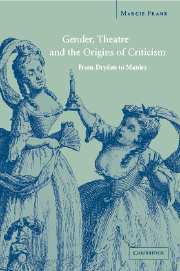Book contents
- Frontmatter
- Contents
- Acknowledgments
- Introduction. The critical stage
- 1 “Equal to ourselves”: John Dryden's national literary history
- 2 Staging criticism, staging Milton: John Dryden's The State of Innocence
- 3 Imitating Shakespeare: gender and criticism
- 4 The female playwright and the city lady
- 5 Scandals of a female nature
- Notes
- Bibliography
- Index
4 - The female playwright and the city lady
Published online by Cambridge University Press: 22 September 2009
- Frontmatter
- Contents
- Acknowledgments
- Introduction. The critical stage
- 1 “Equal to ourselves”: John Dryden's national literary history
- 2 Staging criticism, staging Milton: John Dryden's The State of Innocence
- 3 Imitating Shakespeare: gender and criticism
- 4 The female playwright and the city lady
- 5 Scandals of a female nature
- Notes
- Bibliography
- Index
Summary
When the topic of women playwrights arises in A Comparison Between the Two Stages, an anonymous dramatic dialogue that satirically reviews English drama between 1695 and 1702, it provokes the wrath of Chagrin the critic. His fellow interlocutors, Sullen, a dissenter, and Ramble, a beau, share his concern with the number of women writing for the stage. Such concern was, no doubt, prompted by the remarkable theatrical season of 1695/96, which Paula Backscheider heralds as the high-water mark of female-authored contributions to the English stage. As she notes, over one-third of all the new plays that season were written by women or adapted from women's work. The theatre at Drury Lane produced Delarivier Manley's The Lost Lover and The Royal Mischief, as well as Catharine Trotter's dramatic adaptation of Aphra Behn's Agnes de Castro, and two plays by Mary Pix, Ibrahim and The Spanish Wives; the Lincoln's Inn Fields Company produced She Ventures, and He Wins “by a Young Lady” who called herself Ariadne, Thomas Southerne's adaptation of Behn's Oroonoko, and it gave Behn's own The Younger Brother its posthumous premiere.
As if railing could halt this deluge, Chagrin exclaims:
What a Pox have the Women to do with the Muses? I grant you the Poets call the Nine Muses by the Names of Women, but why so? not because the sex had anything to do with Poetry, but because in the Sex they're much fitter for prostitution. I hate these Petticoat-Authors; 'tis false Grammar, there's no Feminine for the Latin word, 'tis entirely of the Masculine Gender, and the Language won't bear such a thing as a she-Author.
(26)- Type
- Chapter
- Information
- Gender, Theatre, and the Origins of CriticismFrom Dryden to Manley, pp. 91 - 115Publisher: Cambridge University PressPrint publication year: 2002



